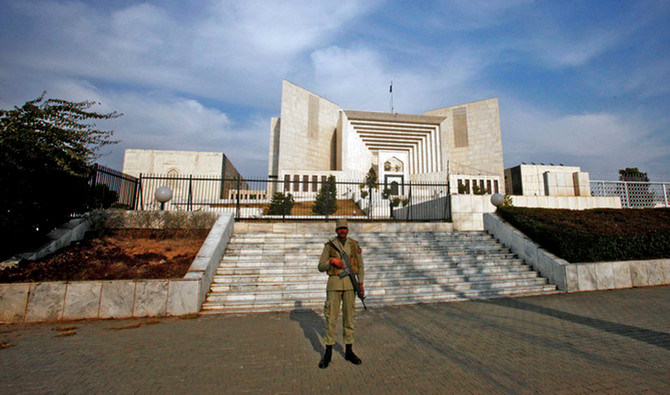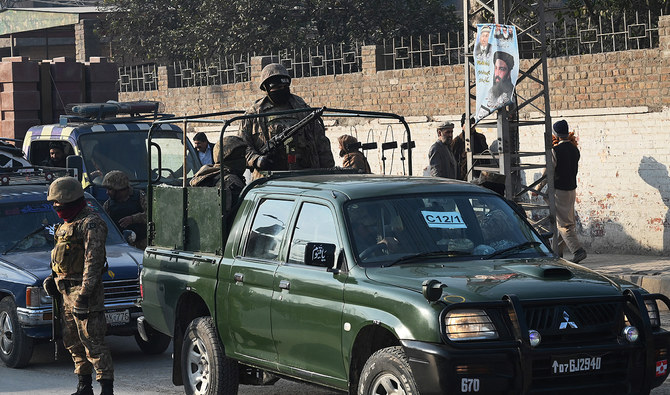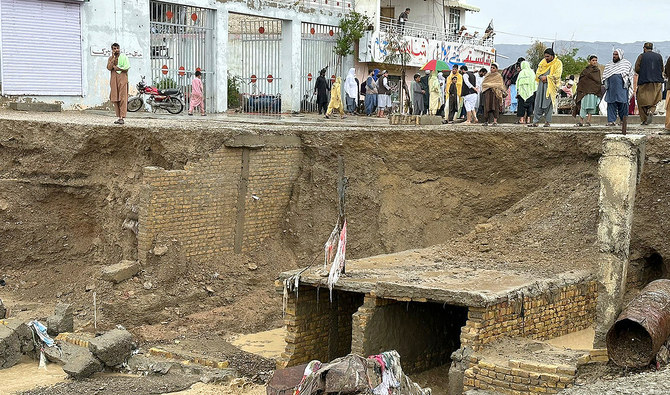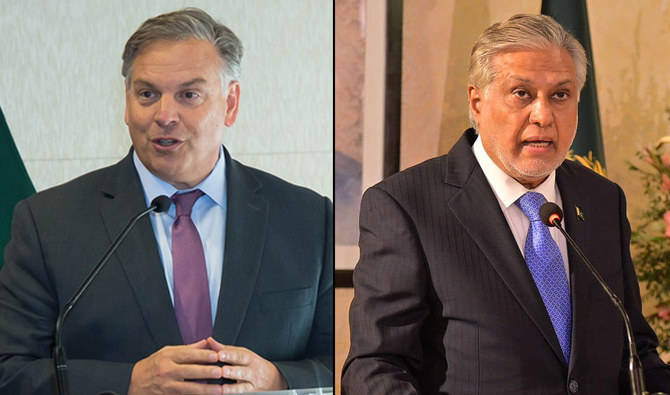KARACHI: Pakistan’s federal government has decided to solicit the support of all opposition parties in order to extend the term of military courts, officials said on Friday.
“We have decided to contact all opposition parties, including the Pakistan Peoples Party (PPP) and Pakistan Muslim League-Nawaz (PML-N) for building a consensus for the passage of a bill, which requires two-thirds majority to be passed,” Information Minister Fawad Chaudhry, who is also the government’s focal person on all issues pertaining to the matter, told Arab News on Friday.
Chaudhry argued that the military courts, which were established to cope with extraordinary situations, have fulfilled their responsibility. “These courts have played a vital role in eliminating terrorism,” he said.
“However, we need two-thirds majority for the passage of the bill. So if opposition parties support the bill, it can be adopted into law,” he added.
Opposition parties said that they were awaiting details of a draft amendment bill which the government intends to present in parliament to extend the term of Pakistan’s military courts.
“We are still waiting for the details of the bill from the government’s side and once we have a draft we will deliberate whether to support or oppose it,” former Prime Minister Shahid Khaqan Abbasi told Arab News.
“The military courts have performed well and if its further need is justified, we may support the extension,” Abbasi said.
Military courts were established in January 2015 by introducing the 21st amendment to the constitution of Pakistan. Since then, they have sentenced more than 300 accused to death.
Their term was subsequently extended for two years with the 23rd constitutional amendment on January 7, 2017.
The bill had, however, received presidential assent on March 31, 2017, which gives the military courts a legal cover until March 31, 2019.
Senator Rehman Malik, former Interior Minister and central leader of the PPP, said: “The parliament will make deliberations over it and will accordingly vote in favor or otherwise.”
“When the law was passed, the country was passing through tough times,” Malik said, adding that the respective political parties will have their own deliberations to assess the present requirements for the country to further curb terrorism.
“Let us wait and see what convincing material is placed by the government before the parliament”.
Malik argues that terrorism hasn’t been completely eliminated yet. “The current incidents in Karachi, attacks on paramilitary and security forces, especially those in Balochistan, indicates that terrorism hasn’t be completely rooted out,” he said, adding that the parliament “will decide this matter in national interest keeping the past performance of the military courts.”
The party’s spokespersons, Maula Bux Chandio and Nafisa Shah, didn’t responded to queries by Arab News for further comments on the matter. However, senior leader Farhatullah Babar said that the party may not support the bill.
“At the last meeting of the central excusive committee of PPP in Naudero on December 26, 2018, the party adopted a unanimous resolution calling upon the parliament not to extend the tenure of military courts any further,” Babar told Arab News.
Moreover, the military courts, he said, were envisaged in the NAP as a short-term measure for two-years only.
“During this period the criminal justice system had to be reformed and anti-terror institutions strengthened,” he argued.
The government and the military, for their parts, reason that the courts have performed well.
“Since the establishment of the courts, 717 cases of accused terrorists were sent to military courts by the government. Of these 717 cases, 546 have been finalized by the military courts,” an ISPR statement shared with Arab News read, adding that out of the 546 finalized cases, 310 terrorists were sentenced to death, while 234 were awarded rigorous imprisonment of varied termd ranging from life imprisonment to a minimum duration of five years.
“Two accused were also acquitted,” the statement said.
Additionally, out of the 310 who were sentenced to death, 56 terrorists have been executed after the completion of legal processes, which included their appeal in superior civil courts and rejection of their mercy petitions both by the army’s top commander and by the president of Pakistan.
Implementation of the death sentences for the remaining 254 terrorists is pending completion of legal process in higher courts.
Government to seek opposition’s support for extension of military courts’ term
Government to seek opposition’s support for extension of military courts’ term

- Reasons that the body has fulfilled its responsibilities in war against terror
- Needs two-thirds majority to make it into a law
Five custom officials among six killed in gun attack in northwest Pakistan

- Officials of the custom department attacked while on routine patrol in Dera Ismail Khan
- Latest killings come amid renewed violence in northwestern and southwestern regions
PESHAWAR: Six people, including five officials of the customs department, were killed and another wounded on Thursday when gunmen opened fire on their vehicle in the northwestern Khyber Pakhtunkhwa province, police and rescue officials said.
Officials of the custom department were out for routine patrol in Dera Ismail Khan city when their vehicle came under attack in the jurisdiction of Draban Police Station, Regional Police Officer Nasir Hussain Satti told Arab News.
“As terrorists started firing on the custom officials, the driver lost control of the vehicle,” Hussain said.
“As a result, their car collided head-on with another vehicle coming from the opposite direction, leaving five officials and a girl dead on the spot while one person suffered injuries.”
KP Chief Minister Ali Amin Gandapur condemned the incident.
“The incident is extremely tragic. Police should take all measures to arrest elements behind the attack,” a statement quoting the chief minister said.
Aziz Dotani, a spokesman at DI Khan district’s Rescue 1122 service, said a relief team promptly rushed to the area to transport bodies to the nearest medical facility.
The latest killings come at a time of renewed militant violence in Pakistan’s northwestern and southwestern regions, especially after the banned Tehreek-e-Taliban Pakistan (TTP) called off its fragile, months-long truce with the government in November 2022.
While there has been a spike in militant attacks across the northwest and southwest of the country, militants have particularly attacked policemen in Khyber Pakhtunkhwa in recent weeks.
Earlier this month, unidentified gunmen shot dead a policeman in the restive North Waziristan tribal district. Separately, an official working with the provincial counterterrorism department and a senior cleric affiliated with the Jamiat Ulema Islam religious political party were shot dead in two separate incidents of “targeted killings” in the North Waziristan tribal district, according to police.
While no group immediately claimed responsibility for the latest killings, suspicion is likely to fall on the TTP, which has had a significant presence in KP before being driven out as a result of successive military operations over the years. Pakistan says the TTP is now mostly based in hideouts in neighboring Afghanistan, which the Taliban denies.
Last month, seven Pakistani soldiers, including two army officers, were killed in a militant attack in North Waziristan, according to the Pakistani military. The attack led the Pakistani military to carry out rare airstrikes against suspected TTP hideouts inside Afghanistan on March 18, killing eight people. The strikes prompted Afghan forces to fire back at Pakistani soldiers along the border.
Afghan Deputy Interior Minister Mohammad Nabi Omari has urged Pakistan and the banned TTP to start negotiations afresh but Pakistan has rejected the Afghan minister’s suggestion, urging Kabul to take action against militant groups operating from its soil.
Both Pakistan and Afghanistan have traded blame in recent months over who is responsible for the recent spate of militant attacks in Pakistan.
Islamabad says the attacks are launched mostly by TTP members who operate from safe havens in Afghanistan. Kabul denies this and blames Islamabad for not being able to handle its own security challenges.
Seven killed in southwest Pakistan as heavy rains continue to wreak havoc nationwide

- At least 33 people killed and 46 injured in various rain-related incidents in northwestern Pakistan
- Pakistan is ranked fifth most vulnerable country to climate change according to Global Climate Risk Index
QUETTA: Seven people including a woman were killed in southwestern Pakistan as rains continue to wreak havoc in the South Asian nation ranked as the fifth most vulnerable country to climate change according to the Global Climate Risk Index.
Heavy rains in the last three weeks have triggered landslides and flash floods in several parts of Pakistan.
On Thursday, seven people were killed in the southwestern Balochistan province, officials in the town of Chaman here the deaths took place said.
“In the first incident a car drove into flood waters in Mashan Talab situated on the outskirts of Chaman,” Deputy Commissioner Chaman Raja Atthar Abbas told Arab News.
“Five men sitting inside the vehicle drowned in flood water while two people including a woman were killed after a mud wall fell on them on College road.”
Torrential rains had caused “severe damage” in Chaman and its surrounding areas as dozens of mud house collapsed in the last two days of rains, Abbas added.
Separately, at least 33 people were killed and another 46 injured in various rain-related incidents in Pakistan’s northwestern Khyber Pakhtunkhwa (KP) province in the last six days, the Provincial Disaster Management Authority (PDMA) said on Thursday.
Rains that began last Friday had completely destroyed 336 houses and partially damaged another 1,606 in different districts across the province, according to the PDMA.
The incidents occurred in Khyber, Upper and Lower Dir, Upper and Lower Chitral, Swat, Bajaur, Shangla, Karak, Tank, Mardan, Peshawar, Charsadda, Hangu, Battagram, Dera Ismail Khan and other districts.
“The deceased include 17 children, eight men, eight women, while the injured included 32 men, six women and eight children,” the PDMA said in its daily situation report on Thursday.
On Wednesday, the authority had warned of another spell of heavy rains in the province from April 17 till April 21, which could trigger landslides and flash floods.
In 2022, downpours swelled rivers and at one point flooded a third of Pakistan, killing 1,739 people. The floods also caused $30 billion in damages, from which Pakistan is still trying to rebuild.
Amir returns to international cricket as New Zealand bat in first T20I

- Amir retired in December 2020 after being dropped from the side but changed his mind last month
- Fast bowler decided to restart his career, which had also been stalled by a match-fixing ban in 2010
RAWALPINDI: Pakistan fast bowler Mohammad Amir returns to international cricket from an absence of almost four years after New Zealand won the toss in their rain-delayed first Twenty20 in Rawalpindi on Thursday.
The 32-year-old retired in December 2020 after being dropped from the side but changed his mind last month and decided to restart his career, which had also been stalled by a match-fixing ban in 2010.
Pakistan have handed T20I debuts to batter Usman Khan, spinner Abrar Ahmed and allrounder Muhammad Irfan Khan to gauge their bench strength ahead of June’s World Cup in the United States and the West Indies.
New Zealand, missing nine players due to the Indian Premier League, handed a T20I debut to batter Tim Robinson.
The remaining matches are in Rawalpindi on April 20 and 21 and in Lahore on April 25 and 27.
Teams:
Pakistan: Babar Azam (captain), Usman Khan, Abrar Ahmed, Iftikhar Ahmed, Mohammad Rizwan, Mohammad Amir, Muhammad Irfan Khan, Naseem Shah, Saim Ayub, Shadab Khan, Shaheen Shah Afridi
New Zealand: Michael Bracewell (captain), Mark Chapman, Josh Clarkson, Jacob Duffy, Dean Foxcroft, Ben Lister, Jimmy Neesham, Tim Robinson, Ben Sears, Tim Seifert, Ish Sodhi
Umpires: Ahsan Raza (PAK) and Aleem Dar (PAK)
Tv umpire: Faisal Afridi (PAK)
Match referee: Andy Pycroft (ZIM)
US says Pakistan’s prosperity and security remains a ‘top priority’

- Blome’s comments come amid a spike in militant attacks in Pakistan
- Pakistani finance chief has launched negotiations for a new IMF bailout
ISLAMABAD: US Ambassador Donald Blome met Pakistani Foreign Minister Ishaq Dar on Thursday and said the South Asian nation’s prosperity and security remained a ‘top priority’ for Washington.
Blome’s comments come amid a spike in militant attacks in Pakistan and while its finance chief is in discussions with the International Monetary Fund in Washington on a potential follow-up program to its nine-month, $3 billion stand-by arrangement.
“US Ambassador Donald Blome met today with Foreign Minister Ishaq Dar to discuss recent events in the region,” Acting US Mission Spokesperson Thomas Montgomery said.
“Ambassador Blome conveyed the United States’ commitment to working with the government and people of Pakistan, underscoring that prosperity and security for Pakistan remains a top priority for the United States.”
Pakistan went to the polls on February 8 in a vote marred by a mobile Internet shutdown on election day, arrests and violence in its build-up and unusually delayed results, leading to accusations that the vote was rigged.
However, the US has repeatedly said it will work with the new government of Prime Minister Shehbaz Sharif, though it has expressed concerns about reported election irregularities and urged a probe.
Although defense and key foreign policy decisions are largely influenced by Pakistan’s powerful military, Sharif will have to juggle relations with the US and China.
Islamabad has close economic ties to both the nations, which has put it in a tricky position as the two countries have embarked upon a costly trade war.
“From our perspective it has to be an and-and discussion,” finance minister Muhammad Aurangzeb said in an interview this week when asked how the Sharif government plans to conduct its trading relationships with the world’s two largest economies.
“US is our largest trading partner, and it has always supported us, always helped us in terms of the investments,” he said. “So that is always going to be a very, very critical relationship for Pakistan.”
“On the other side, a lot of investment, especially in infrastructure, came through CPEC,” he said, referring to the roughly 1,860-mile-long China-Pakistan Economic Corridor designed to give China access to the Arabian Sea.
Aurangzeb said there was a “very good opportunity” for Pakistan to play a similar role in the trade war as countries like Vietnam, which has been able to dramatically boost its exports to the US following the imposition of tariffs on some Chinese goods.
“We have already a few examples of that already working,” he said. “But what we need to do is to really scale it up.”
Militancy has also spiked in recent months, creating a major challenge for the new government, with religiously motivated groups like the Pakistani Taliban as well as ethnic separatists showing an enhanced ability to hit high-value targets.
In an attack last month that has so far been unclaimed, a suicide bomber rammed a vehicle into a convoy of Chinese engineers working on a hydropower project at Dasu in the northwestern Khyber Pakhtunkhwa province, killing five Chinese nationals and their Pakistani driver.
The Mar. 26 assault was the third major attack in little over a week on China’s interests in the South Asian nation, where Beijing has invested more than $65 billion in infrastructure projects as part of its wider Belt and Road initiative.
Central bank chief briefs foreign investors on ‘substantial improvement’ in Pakistan’s macroeconomic outlook

- Ahmad is accompanying Finance Minister Muhammad Aurangzeb to IMF and World Bank spring meetings in Washington
- Meets investors during multiple events organized by leading financial firms, including JP Morgan, Citibank and Jefferies
ISLAMABAD: State Bank Governor Jameel Ahmad on Thursday met key international investors in the United States capital, Washington DC, and informed them about “substantial improvement” in Pakistan’s macroeconomic outlook in the last year.
Ahmad is accompanying Finance Minister Muhammad Aurangzeb to IMF and World Bank spring meetings in Washington, where he met investors during multiple events organized by leading global banks and financial firms, including JP Morgan, Citibank and Jefferies.
While in DC, the Pakistan team will also be starting negotiations for a new three-year multi-billion-dollar bailout deal from the IMF.
“Governor SBP informed the participants about the substantial improvement in Pakistan’s macroeconomic outlook achieved over the past year as a result of a prudent monetary policy, backed adequately by fiscal consolidation and beginning of the implementation of key structural reforms,” a statement from the Pakistani economic affairs division said.
Inflation declined sharply in Pakistan, reaching a two-year low of 20.7 percent in March 2024 from a peak of 38 percent in May 2023.
“Deceleration in inflation is broad-based, reflecting the combined impact of monetary tightening, fiscal consolidation, ease in import supplies, improved agriculture output and base effect,” Ahmad told investors.
“More importantly, core inflation declined markedly, reaching 15.7 percent in March, after persistently staying above 20 percent throughout last year.”
He also said the external sector had stabilized, as reflected in a sharp reduction in the current account deficit (CAD) to $1 billion during Jul-Feb FY24 from $3.8 billion in the same period last year.
In addition to stabilization policies, improved agriculture output had contributed to higher food exports, while lowering the import demand of agri commodities like wheat and cotton.
Workers’ remittances had also risen consistently since October 2023 on a year-on-year basis, driven by incentives and regulatory measures to divert inflows toward formal channels.
“These qualitative improvements in the external account have allowed the SBP to more than double its FX reserves from January 2023 ($3.1 billion) to around $8 billion on 12 April 2024 despite the repayment of a $1 billion Eurobond on the same day. At the same time, the SBP’s forward liabilities have also reduced significantly from $5.7billion in January 2023 to $ 3.4billion in February 2024.”
Ahmad also spoke about the improvement in the country’s external debt dynamics, with a reduction in the gross financing requirements due to sizable CAD contraction. Moreover, the maturity profile of external debt had also improved, with the share of relatively costly short-term commercial loans declining while the share of long term concessional financing from multilateral agencies, coupled with support from bilateral partners, which was rising.
“Ahmad also noted a recent pickup in inflows from overseas Pakistanis via Roshan Digital Accounts and also by other foreign investors, on the back of strong performance in achieving the targets and benchmarks under the IMF SBA program,” the statement said.
“Going forward, the government is hopeful of signing a long term IMF program, which will facilitate additional external financing and the adoption of structural reforms to deal with longstanding issues in the economy.”
The governor also highlighted SBP’s efforts to provide a conducive macroeconomic environment for the private sector to invest in the economy.
The SBP’s Strategic Plan 2028 aims to facilitate growth by achieving price and financial stability.
“In this regard, Mr. Ahmad highlighted the widespread adoption of digital technologies to address gaps in access to financial services and to revolutionize the domestic payments system,” the economic affairs division said. “These time-bound reforms are expected to put the economy on the path of sustainable economic growth.”










